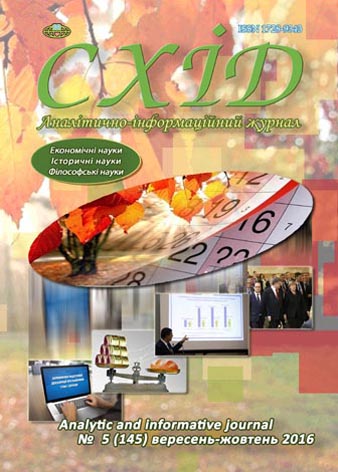Fear: methodological analysis of the phenomenon features
DOI:
https://doi.org/10.21847/1728-9343.2016.5(145).83848Keywords:
fright, human nature, freedom, the strain of civilization, fright of a Western European medieval man, fright and the epoch of Western European Renaissance, epoch of fright, man of frightAbstract
Fright is analyzed both as one of the important characteristics of a person, and as a topical issue of humanitarian science, in particular philosophy. Phenomenon of fright is substantiated as an innate ontological nature of a person which is inherited from nature (animals, first of all) but "cultivated", "socialized" and is considered to be the object of a personal reflection. It is shown that fright is immanently connected with a complex of human rights and freedoms and, especially, with satisfaction of human safety needs. It is proved that freedom is the key source of fright and these phenomena are closely interconnected. Fright both in the conditions of straitened freedom by perforce, and in the conditions of straitened freedom in itself is characterized. Fright features of a Western European medieval man in the conditions of so called stable unfreedom, that is straitened freedom by perforce, with his psychological disharmony, suffering from spiritual and social depression, as well as from the risk to manifest his real "Self" is shown. Fright features of a Western European Renaissance man in the conditions of liberation from church dogmata (external freedom) but in the context of inside constrained freedom are shown. Taking into consideration the tendencies and the features of modern world, the conclusion is drawn that today's epoch is an epoch of fright and today's man is a man of fright.
References
Haznyuk, L. (2006), Philosophical studies physical-existential existence, PARAPAN Publishing, Kyiv, 368 p. (ukr).
Khamitov, N.V. (2002), Human philosophy: from metaphysics to meta-anthropology Nika-Tsentr Publishing, Kyiv, Institute of humanities research, Moscow, 334 p. (rus).
Turenko, O.S. (2008), Value of social responsibility and fear in the concept of the nation state, today Ukrainian, Science. Religion. Society, № 1, 93-99 (ukr).
Melnyk, V. (2013), Socio-philosophical explication fear the material Protestant version of existentialism, Thesis for the degree of Doctor of philosophical sciences after specialty 09.00.03 «Social Philosophy and Philosophy of History», Slavyansk, 388 p. (ukr).
Horokhova, L.V. (2012), Existential fear of being a modern man: social-philosophical analysis, Abstract of Thesis for the degree of Candidate of philosophical sciences after specialty 09.00.03 «Social Philosophy and Philosophy of History», Zhytomyr, 16 p. (ukr).
Terrorist attack in Nice: the French have less trust in authorities. Korrespondent.net. 18.07.2016, available at: http://korrespondent.net/world/3719063-terakt-v-nytstse-frantsuzy-staly-menshe-doveriat-vlastiam
Jaspers, Karl (1994), The Origin and Goal of History [translat.], Republic Publishing, Moscow, 527 p. (rus).
Spengler, Oswald (1923), The Decline of the West [translat.], Vol.1, W.p., Moscow, 467 s. (rus).
Kierkegaard, Søren (1993), Fear and Trembling [translat.], Republic Publishing, Moscow, 383 p. (rus).
Popper, Karl (1994), The Open Society and Its Enemies [translat.], Ocnovy Publishing, Kyiv, 444 p. (ukr).
Mordvintseva, L.P. and Gurevich, A.Ya. (1994), Individuality in the Middle Ages: Opitsinus de Kanistris, Ref. Journal. Social Sciences and Humanities, № 4, Ser. 3. Philosophy, 194-200 (rus).
Huizinga, J. (1988), The Waning of the Middle Ages: The study forms of lifestyles and ways of thinking in the XIV-XV centuries in France and the Netherlands [translat.], Nauka, Moscow, 542 p. (rus).
Downloads
Published
How to Cite
Issue
Section
License
Copyright (c) 2016 Volodymyr Muliar

This work is licensed under a Creative Commons Attribution-NonCommercial-NoDerivatives 4.0 International License.
1. Authors bear responsibility for the accuracy of facts, quotations, numbers and names used.
2. Manuscripts are not sent back.
3. The publisher does not always agree with the authors' opinion.
4. The authors reserve the right to authorship of the work and pass the first publication right of this work to the journal under the terms of a Creative Commons Attribution Non-Commercial License, which allows others to freely distribute the published research with the obligatory reference to the authors of the original work and the first publication of the work in this journal.
5. The authors have the right to conclude separate supplement agreements that relate to non-exclusive work distribution in the form in which it has been published by the journal (for example, to upload the work to the online storage of the journal or publish it as part of a monograph), provided that the reference to the first publication of the work in this journal is included.

